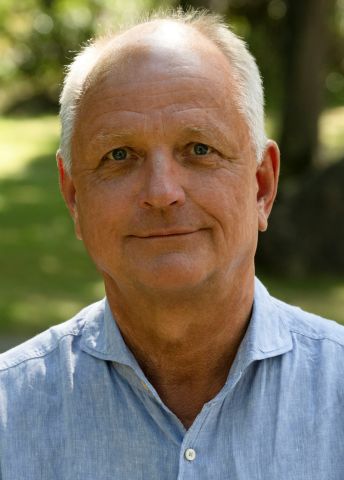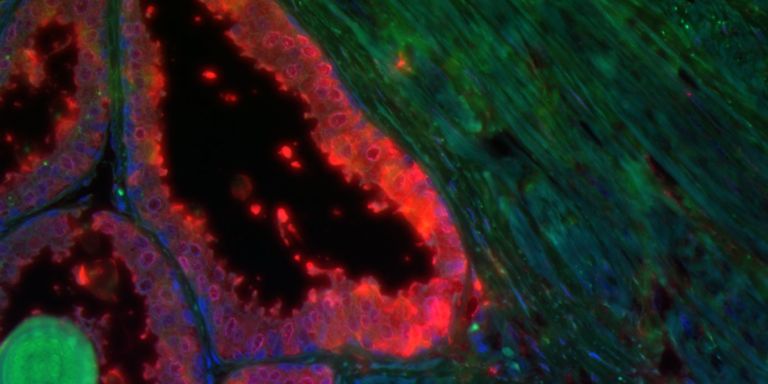
Olle Kämpe
Consultant and Professor of Clinical Endocrinology
Wallenberg Clinical Scholar 2019
Institution:
Karolinska Institutet
Research field:
Autoimmune diseases


Wallenberg Clinical Scholar 2019
Institution:
Karolinska Institutet
Research field:
Autoimmune diseases
“The price for a really effective immune system may be that it has a tendency to react against itself. Viruses and bacteria want to hide so they can deceive the system. The difference between the body’s own tissue and foreign material can therefore be wafer thin,” says Kämpe, who is a Wallenberg Clinical Scholar.
Autoimmune diseases are considered to be the third-most serious category after cardiovascular disease and cancer. Most sufferers are women.
“Women run three to four times greater risk. Studies suggest that men generally have a less effective immune system than women. The Covid-19 pandemic has further demonstrated this.”
Kämpe and his research team are focusing mainly on model diseases – rare conditions like Addison’s disease. John F. Kennedy was one famous victim of the disease, which occurs when the adrenal glands stop producing two vital hormones: cortisol and aldosterone.
“They regulate salt, fluid balance and appetite. If production ceases and the patient is not treated in time, death will result.”
In Sweden some 1,200-1,300 people suffer from the disease. In 1992, Kämpe’s team established that the immune system in Addison’s disease reacted to 21-hydroxylase, an enzyme exclusively expressed in the adrenal cortex where cortisol and aldosterone is produced. This knowledge is now used worldwide for the clinical diagnosis of the condition. The research team’s expertise and tools span genetics, immunology, clinical studies and studies of large Swedish registries.
“We have been greatly aided by the Swedish Addison’s Association. With their help we have collected samples from over a thousand patients, enabling us to create the world’s largest biobank for Addison’s disease.”
Working with researchers in Bergen, Norway, the team is attempting to understand the biological and genetic factors that increase the risk of developing the disease. In addition to Addison’s, they are using two other unusual autoimmune diseases, abbreviated APS1 and IPEX.
The group has identified that patients with APS1react against a protein abbreviated as SSC, and using this marker they have succeeded in finding women who have Addison’s disease and are in the process of becoming infertile.
“A woman with Addison’s disease has a ten to fifteen percent risk of developing an autoimmune reaction to her own ovaries, causing her to enter the menopause at a younger than expected. We’re trying to identify young women with Addison’s disease who have antibodies against SCC, and treat them with modern biological therapeutics in the form of monoclonal antibodies to prevent development of premature infertility.”
The first two women treated with biological therapeutics succeeded to produce eggs, even though they have already prematurely entered the menopause. These eggs have now been frozen for future use.
“It’s very promising, but so far we only have results from two women. We were forced to halt the study when the coronavirus pandemic struck, since we didn’t want to modify the immune system in these circumstances.”
In Kämpe’s opinion, the discovery of SSC also shows that a rare disease such as ASP1 can be used as a basis for finding diagnostic tools for use on other diseases.
Another approach they have adopted is to use a known starting point for the autoimmune reaction as a basis for understanding what triggers autoimmunity.
“The immune system cross-reacts to some tumors. In those cases, symptoms of a skin disease or deteriorating eyesight may indicate that the tumor has triggered something. Autoimmunity may also arise as a side-effect of ‘checkpoint inhibitors’, currently used as a form of cancer immunotherapy.”
A third model is to compare 40 men and 40 women who have undergone gender reassignment.
“We want to find out why women run a higher risk of developing autoimmunity. The immune system is impacted by factors such as the environment and whether or not the person has been vaccinated. Monitoring people who have undergone gender reassignment will give us the same environment and the same vaccinations in a given genetic individual, but with different hormone levels.”
Using studies of comprehensive Swedish registers, they have also been able to show that many Addison’s patients are overmedicated with hydrocortisone, which increases the risk of heart attack and excess mortality.
“Following these findings, we have now drawn up guidelines that have had a national and international impact.”
This has also given birth to the idea of a hydrocortisone pump, along the same lines as an insulin pump.
“This would deliver hydrocortisone in a way more like the body’s own production of cortisol, and improve both quality of life and life expectancy.”
Kämpe also works clinically as an endocrinologist, specializing in hormone-related diseases. He sees patients once a week.
“After doing work experience in a hospital during my schooldays, I dreamed of becoming a doctor. I considered pursuing research when starting Medical School, but didn’t really understand at first on what researchers did, and thought maybe I wasn’t smart enough.”
After three years of medical studies Kämpe took a break so he could do research full-time, but after receiving his PhD and working as a postdoc, he began to doubt his prowess as a researcher. He then completed his medical studies, and began working as a clinician.
“I originally planned to become a hematologist, but it turned out to be hard to combine the demands of daily clinical work with research – working as a physician leaves little time for anything else. So I chose to become a simple endocrinologist.”
Text Carina Dahlberg
Translation Maxwell Arding
Photo Sara Öster
Autoimmune diseases occur when the immune system attacks the body’s own tissues.
They can be divided into two kinds: organ-specific diseases, in which only one type of tissue is destroyed, such as type 1 diabetes, Addison’s disease, celiac disease, and diseases of the thyroid gland; and systemic autoimmune diseases, in which multiple organ systems are affected, such as SLE, rheumatoid arthritis, and Sjögren’s syndrome.